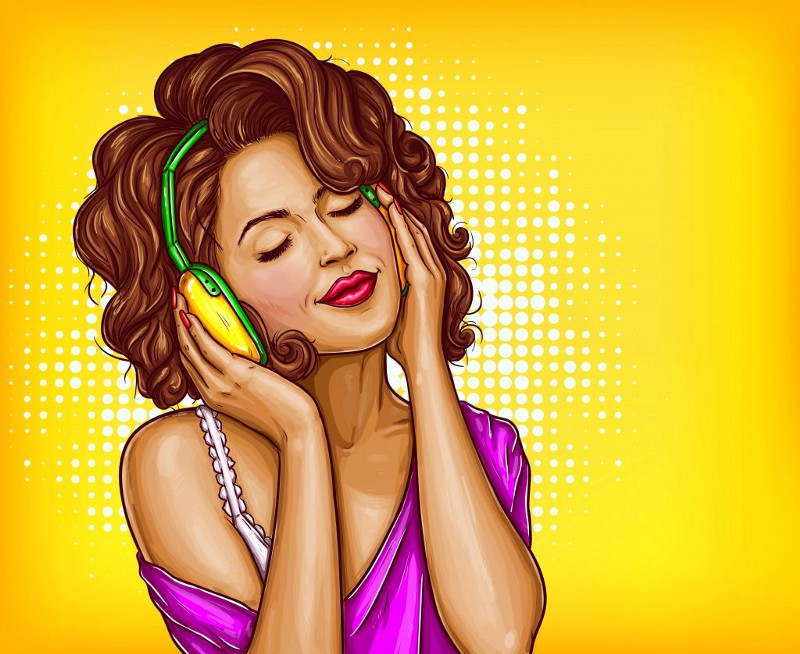Standing in the 21st century, with a fragmented world on one side and beaming hopes on the other, the only constituent which effectively seems to unite these two strings is art and its distinct forms. Everything that soothes your senses, allows you an escape from the regular and fills your mind with tranquillity is qualified under this category and here, music is no exception. There’s a string of reasons that explains why we all have our preferred playlists; apart from the emotional connect, music evokes a psychological trance that stimulates the adrenaline rush and fills both our minds and body with a slice of daze from the same. As common beings, whenever we happen to like something, most of all, it excites us and our body seems to give away the symptoms every time- the heart starts thumping, the pupils dilate and the blood flow is commonly redirected towards our hands and legs thus, making the feet and palms lose temperature. All these reactions stem from the cerebellum which is triggered when it is alerted with something exuberant and captivating.
The intricacies of the brain
If you notice carefully you will see, regardless of the ambiance surrounding you, if there is a song playing that strikes the right chords of your heart, the entire world shuts away and you are taken deep into a zone where nothing else matters other than the conspicuous elements of the music and the temporary abstraction that you gradually seem to slip in. Mostly, there is a tingling sensation in the back and top of your head and body which then makes way for Goosebumps with no relevant cause as such; however, science begs to differ and thereby, procures us with a strapping explanation of all these occurrences. Researches have claimed that more than half of the population get Goosebumps when they are listening to some powerful of moving piece or simply browsing through their go-to songs. This is because, like we have already mentioned, the cerebellum is activated and it signals the brain to increase the production of dopamine in the blood to striatum. The striatum of the brain, on the other hand, is invoked only when it senses something that is addictive, rewarding, enthusiastic and encouraging.
Music appears to furnish the striatum with the same instincts that open door to these sensations, much like some adventurous sports, ambiguity right before a crucial result or declaration one hand, if we are acquainted with a track, the body will produce Goosebumps only when we know we are nearing or already are in its peak point, similar to what we like to call the climax in a movie. On the other hand, if we have never heard the music before, the moments of getting the Goosebumps are unpredictable, because it mostly teases the brain and lets the dopamine itself identify the points from where it would derive its optimum level of satisfaction.

The grey areas matter too
There is yet another theory that opposes this hypothesis and states the reverse and this revolves around the findings that our body develops Goosebumps when it listens to sad music more than its counterpart. It states that, when the words and the tunes of despondency hit our brain, it takes us back to the corner of anguish where only hopelessness and pain prevails. This means that soon after we hear the music, if we start relating it with some incident from our past that has been characterised by incessant pangs and grief, only then will the brain start flushing the chills.
Nevertheless, the most intriguing factor of this theory lies in the verity that the Goosebumps symbolise a positive reaction to music, even if the memories are wrecking, and there is a strange sense of satisfaction when these contrasting impulses are intermixed. Thus, the experience can be equated with purgation where, catastrophe is implemented to drain off the tragic feelings and turn the experience into a prodigiously positive one.
When music meets your expectations
Lastly, Goosebumps from music cannot be restricted to a specific genre; you might get the chills even from the section of music that you are not too fond of and that is, undeniably, the whole beauty of it. Also, we cannot steer away from acknowledging the reactions that run throughout our bodies when the music meets our expectations, meaning, when it travels in amongst the spaces we are familiar with. When tunes rightly fall into place with our constituents of anticipation, the nucleus accumbens are generously galvanised. This action is related to the whole dopamine-generation theory and the little areas where the brain awaits for its turn to catch-up with the fluency of the flow is where you get Goosebumps.

These are the factors that have as its pivot results from scientific researches and are mostly concerned with the music and the brain, but strangely enough, sometimes your personality matters too. As per the findings of experts, if you are a person with a more or less positive aura and likes to welcome the unpredictable sections of life with an optimistic perception, then music will evidently give you Goosebumps. Like life, these people are always on the look-out for something interesting and different that they have never known before and wants to travel through every corner and find the hidden treasures to ultimately decide whether they like the track or not. Nevertheless, these conclusions have been derived from a study conducted at the UNC Greensboro, but, Germany actively opposes their views. For them, it is in reality, people who prefer comfort over adventure are most likely to experience chills as they relate to music as a cradle driven with rewards, because as they prefer following a pattern without too many modifications, music is the only thing that helps them with a foundation of exception without being an explicit one itself.

